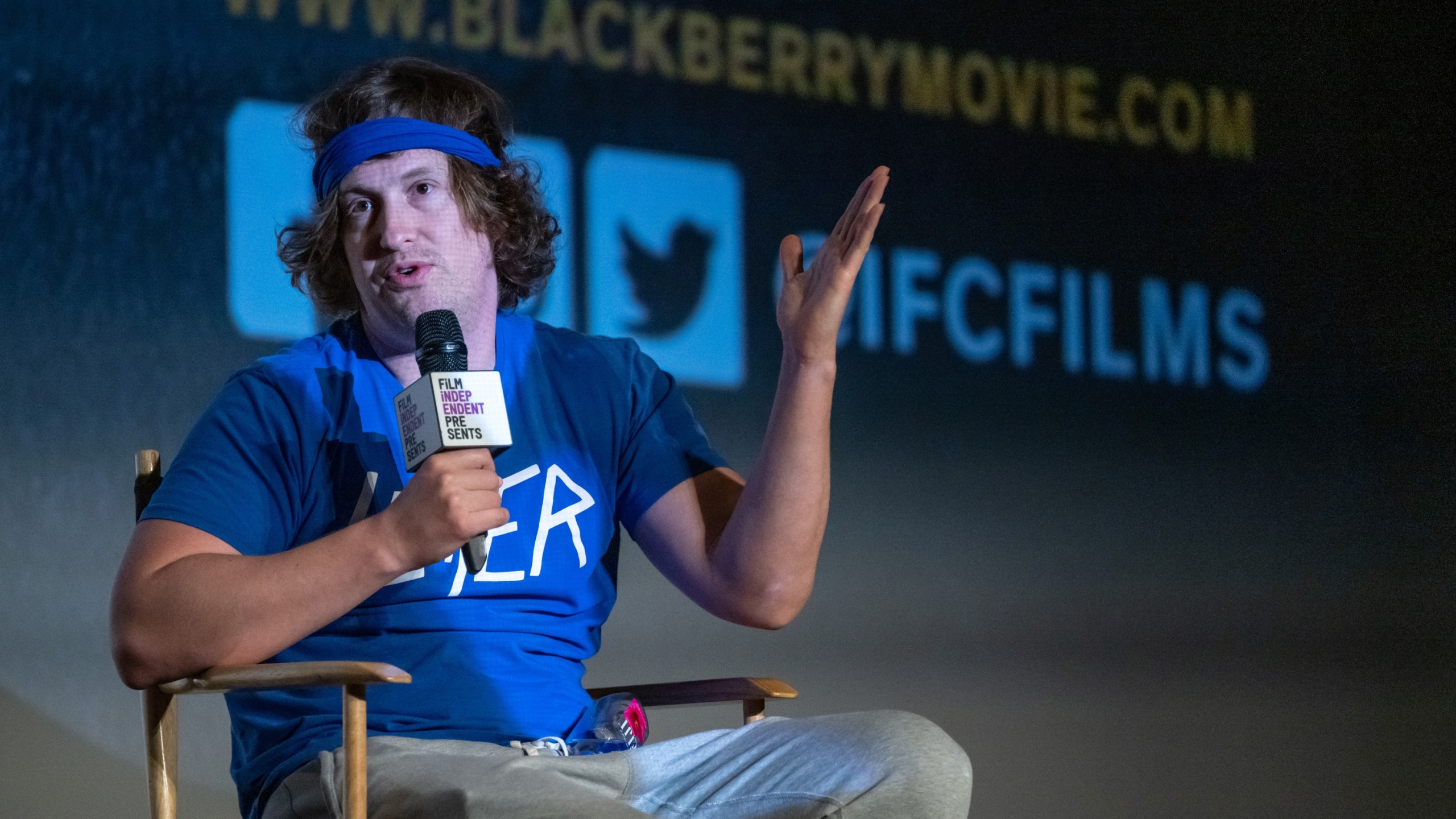In 2010, David Fincher set the template for modern tech biopic with “The Social Network,” delivering a rapid-fire seriocomic portrait of young entrepreneurship at the dawn of the 21st century. It cost $40 million. Last year, filmmaker Matt Johnson made “BlackBerry,” a biopic about the rise and fall of the eccentric characters behind the outdated mobile phone. It cost $5 million.
“The amount of money that gets spent on making a movie is completely mind-boggling to me,” Johnson told IndieWire over Zoom. “We were pretty clear from the beginning we would make something on the scale we prefer.”
That ethos was established 10 years ago, when the Canadian director made the buzzy found footage movie “The Dirties,” in which Johnson starred as an aspiring filmmaker who morphs into a high school shooter. The $10,000 movie manages a tricky balance between satirizing its character’s cinematic aspirations and the looming alienation that drives him to a horrific extreme. The complex and emotional provocation won Slamdance and gained support from Kevin Smith, who helped distribute the movie. “Our lives changed very much,” he said. “Going from a broke student filmmaker to having a career was extremely difficult to manage.”
While Johnson signed with an agency and entertained studio offers, he continued to churn out innovative lo-fi work from his perch in Toronto, including 2016’s “Operation Avalanche,” a playful snippet of historical fiction in which Johnson and Owen Williams play young CIA agents tasked with faking the moon landing in 1969. He also created the web series and eventual Canadian TV show “Nirvanna the Band the Show,” which ran from 2017-2019 and was made with the same collaborators.
“For the most part, studio heads really do want to meet with young, interesting voices,” Johnson said. “It’s generally a meritocracy. But my experience was that nothing really spoke to me, and I always came back to what interested me because of that.”
His longtime writing and producer partner Matthew Miller, who joined him on Zoom, chimed in. “None of this ever felt like work,” he said.
“BlackBerry” marks the first time John and Miller worked on material together that they didn’t originate, as they adapted the script from the book “Losing the Signal: The Untold Story Behind the Extraordinary Rise and Spectacular Fall of BlackBerry,” after producers who had acquired rights to the book approached them about directing it. “They could’ve given the material and book to more conventional filmmakers and would’ve gotten something more conventional,” Miller said said.
Instead, Johnson and Miller turned the saga into a wry, almost minimalist workplace comedy. At its center is the evolving dynamic between geeky innovator Mike Lazaridis (Jay Baruchel) and his fun-loving partner-in-crime Douglas Fregin (Johnson), as their shrewd idea for a smartphone capable of sending and receiving emails attracts the attention of combustible executive Jim Balsillie (Glenn Howerton, bald and gruffer than his “It’s Always Sunny in Philadelphia” persona).
After Balsillie talks his way into becoming co-CEO of the scrappy startup, “BlackBerry” careens through a series of cringe-worthy chapters in the company’s history as loyalties are tested and the original duo’s easygoing workplace environment gets forced into the cutthroat demands of a corporate ecosystem. Through a series of shouting matches, awkward pitch sessions, and slapstick twists (including a prototype that goes missing moments before a big presentation), “BlackBerry” magnifies the underlying tension between personalities when innovation and capitalism collide.
Johnson said that while he hasn’t done his time in Silicon Valley, he was still able to draw from personal experiences. “We tried to make it very close metaphorically to what filmmaking is like,” he said. “How success can change the culture of a production company — we just grafted that onto corporate culture.”

They were also wary of mocking Lazaridis, a geeky figure played Baruchel with a level of empathy he hasn’t shown onscreen before, as the character attempts to do the right thing with the technology even as Balsillie attempts to push the company into legally dicey and otherwise tumultuous territory.
In other words, nothing like the goofballs on “Silicon Valley,” a show he knew would come up as a comparison early on. “Those guys are very clearly trying to be funny and very proud of themselves for it,” he said. “That’s revolting to me, and it wasn’t influential in terms of how we did this.”
Instead, he turned to more serious precedents, looking at “All the President’s Men” as well as D.A. Pennebaker and Chris Hegedus’ 1993 Bill Clinton campaign documentary “The War Room” to determine the approach. “They had a lot of scenes with men in rooms trying to change the world,” Johnson said. “We didn’t want to Hollywoodize it and make these guys seem like Elon Musk. They had to be like LAN party nerds who — by happenstance — wind up changing the world and not even realizing they did it.”
While it lacks the polished surfaces of “The Social Network,” Johnson and Miller did enough research ahead of the writing and production process to make a much bigger movie. They secretly interviewed ex-staffers and combed through diaries from several stages of the company’s history, from its early successes to the downward slope of its existence in the aftermath of the iPhone release. Their production designer put together a bible for the show out of 2,500 photos provided by former BlackBerry employees.
That provided the key to their low-budget approach. “BlackBerry” takes place in a handful of messy office spaces and bland conference rooms. There are no massive crowd scenes or travel montages. “We were working with very little money and that meant we needed to shoot it a certain way,” Johnson said. Still, the budget for the movie came together in piecemeal, which created some new challenges. Telefilm Canada provided the bulk of the financing (with less than 10 percent provided by the American-based XYZ Films).

The Canadian financing made it difficult to cast any American actors, including Howerton, despite his fame. “It wasn’t until very close to production we were finally able to present it to him,” Johnson said. The result is the actor’s first great performance outside of “It’s Always Sunny in Philadelphia,” which returns with its 16th season in June. “The fact that we have Glenn shaving his head and sticking with it creates a sense that this movie is going somewhere,” Johnson said. “It buys us so much good will. It’s a comedy performance but the characters don’t think he’s funny. He’s deadly serious and quite humorous.”
Johnson’s homegrown approach had to evolve to meet the needs of actors who weren’t part of the original group involved in all of his previous endeavors. “Normally, I’m just working with my friends and everything is improvised,” he said. “You very much direct and write on the fly. This had to be done differently because of strangers who didn’t necessarily trust me. It wasn’t until the second week of shooting that we could start taking risks.”
Eventually, Johnson was able to settle back into his usual documentary-like approach, which finds him shooting in wide shots and encouraging his actors to keep performing without any real sense of when the cameras are rolling. “I’m expecting people to always be on,” he said.
Producers were able to pre-sell U.S. rights to IFC off material screens for buyers at AFM last fall, which helped cover finishing costs ahead of the movie’s premiere at Berlin in February. After the movie’s premiere, Paramount acquired international rights. “It’s been so much fun to have the support of these distributors, but it’s also very odd,” Johnson said. “I’ve been able to do what I want, I always have final cut, and I can literally make anything I want to make.”
Now, the 37-year-old director is keen on maintaining that setup rather than entertaining that kind of offers thrust his way a decade ago. “We started making stuff in our twenties in different life positions and all our friends were paying cheap rent,” he said. “As you get older and want to work with the same people, it’s harder. But we hope to keep being able to graduate up that way.”
IFC Films opens “BlackBerry” in limited theaters on Friday, May 12.


